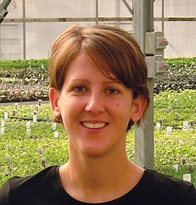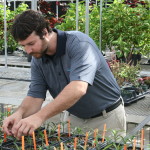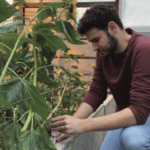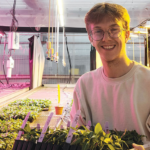
Intern to Learn — Janna Ellen Hogue 2002
The experience of Janna Ellen Hogue, a junior at Iowa State University and winner of the 3rd Annual GPN/Nexus Intern Scholarship, should encourage and inspire students, universities and greenhouse operations alike to continue supporting internship programs and, in turn, to help create a wealth of young professionals that will ensure a stronger industry for everyone.
You sigh. A homogenously intimidating stack of laser-printed, perfectly formatted, past-tense action verbs on white and cream, 25-percent cotton fiber paper sits before you. One of the cover letters reads: “I consider myself a confident, dynamic and dependable person capable of energizing and motivating my coworkers. One of my strongest traits is my work ethic. I set high goals for myself, and I work hard to achieve them.” You raise an eyebrow, considering and curious.
If you’re a grower on the market for greenhouse management material, the magnanimity you envision through these words might impress you just enough to set the piece of paper framing them aside. But sometimes, words are not sufficiently convincing. Wouldn’t it be easier if you actually knew the person, could test them out in the field for a relatively low cost and knew, with confidence, that the words you read on paper could be substantiated and that you could ensure a wise personnel investment?
The good news is you can. The answer has been around for a long time, but is often underemphasized, underpublicized and consequently, underutilized. It’s an internship. And for everything it is meant to accomplish – practical, “real world” experience, a differentiated resume, a more grounded idea of career direction, the confidence honed through independence and decision-making – it works. Janna Ellen Hogue, a junior at Iowa State University and winner of the 3rd Annual GPN/Nexus Intern Scholarship, can attest to these benefits and more. Her experience should encourage and inspire students, universities and greenhouse operations alike to continue supporting internship programs and, in turn, to help create a wealth of young professionals that will ensure a stronger industry for everyone.
Practical education
For six and a half months in 2001, Janna Hogue, a Greenhouse Production and Management major, top student at ISU and a member of the university’s Horticulture Club and the Mid-American Collegiate Horticulture Society, left Iowa behind her and made a home of Huntersville, N.C., to elevate her book and lab-based knowledge of growing plants to the level of real life. Specifically, it was real life in the context of Metrolina Greenhouses, a grower specializing in spring bedding plants, fall mums, pansies, poinsettias and hanging baskets. Janna spent much of her time irrigating crops; spraying pesticides and growth regulators; and cleaning, cutting back, spacing, weeding and deadheading plants. She learned how to do substrate drenches with either fungicides or growth regulators and took soil samples to measure pH and EC. Taking and sticking vegetative cuttings and learning about poinsettia and chrysanthemum propagation, as well as identifying plug maladies through the digital photos she took and the expertise of a consultant’s eye, were also among the invaluable experiences she gained from Metrolina.
Much of what she, and most interns, reap from their experiences, however, are both intangible and immeasurable in value. Dick Gladon, Janna’s advisor and a professor of various floriculture courses, verbalized the intangible as a multi-faceted process of evolution that can culminate in either a better-defined idea of the original career path – or complete abandonment of it.
“First, the student removes themselves from the warm and comfy environment of either home or the university. This can be a great building experience when they are in a different part of the country and no one is there to help them out. This builds confidence and independence. Second, it gives the student an opportunity to work in his or her chosen field before they make a commitment to an entire degree program in that area. The number of students who, once they have a good internship experience under their belt, realize that this is not what they really want to do with their life would surprise you. By having this experience early enough in their college career, they can make the needed adjustments in their career path. Sometimes this leads to minor changes in their coursework, but other times, it leads to a change of major or dropping out of college until they know better what they want to do,” he explained.
In Janna’s case, Metrolina helped cement her resolution that her horticulture major is the right path and will guide her in choosing her next internship. “Confidence was the most important thing I took away from my internship at Metrolina,” she said. “The skills I acquired gave me confidence about being a grower, reassured me that greenhouse production and management is for me, and made me feel better about finding a good job after graduating. I also gained confidence in knowing that I can live hundreds of miles from home on my own. It’s a good feeling to know you can be independent.”
According to Sim McMurry, head grower at Metrolina and Janna’s supervisor during her time in North Carolina, Janna has every reason to believe that she will excel when she graduates. “Janna has a super attitude, is very hard-working and extremely intelligent. She will be successful no matter where she ends up,” he confirmed.
Janna also feels that there is no substitute for an internship experience, further echoing her advisor’s explanation of the value of practical work in the real world. “For me,” she reflected, “my internship was an added dimension to my education. Internships strengthen what you learn in class, build confidence as you work and acquire skills, and help you determine whether the occupation fits your future goals. The internship taught me an immense amount and directed me toward another internship focusing on growing plugs. Internships definitely help you network and get your name out there.”
Getting connected
For many students, just figuring out where to start looking may be one of the most daunting aspects of choosing an internship. Just how does a student, who may feel nameless and faceless in a national pool of potential interns, succeed at making the connection that could mean the eventual doorway to their first job? Utilizing the ready guidance of an academic advisor and university alumni/alumnae who are actively engaged in the industry are helpful ways to move forward. For Janna, both resources were instrumental in landing her the position with Metrolina. “I contacted Brian Whipker at North Carolina State, who was formerly at ISU, for his recommendations for potential greenhouse employers in North Carolina,” she said. “Metrolina Greenhouses was at the top of the list, and they were willing to hire me as an intern. My advisor at that time, Barb Osborn, was very helpful and supportive of my decision.”
Janna chose Metrolina for two reasons: First, because she wanted to work for a company that could provide her with a well-rounded internship, and second, because visiting the Carolinas had always been one of her dreams. Once she made Metrolina her target, Janna was focused and intent on following through with her objectives, corresponding with the operation herself to make sure everything was in order.
For those universities – ISU included – that do not require an internship to graduate, student interest and advisor encouragement are of paramount importance. Janna feels that students “know” they should have an internship experience, whether a university mandates it or not. Many students, however, need a delicate push to translate passive knowledge into action. “I encourage my advisees, when I get them as an incoming freshman, to look for and plan for three internship experiences,” said Dick. “I suggest that the first one should be between the freshman and sophomore year that and it should be relatively close to home. The student might still need the comforts of home at this point, and it is better not to shove them off too soon. Developmentally, most college students realize sometime between the middle of their freshman year and the middle of their sophomore year that they really cannot go home anymore, except as a visitor. Because this is a variable time frame, I feel that it is better to be closer to home than farther away. If they really were ready to be away from home after their freshman year, a summer at home when they really do not want to be there will do wonders for them shoving off for new horizons the next year. I recommend that the second internship experience be away from home completely, and depending upon the student, being either a summer experience or a summer plus one semester experience. I then recommend that the third internship experience be completely away from home and anywhere from six months to one year.”
Real-world preparation
For those students out there still wondering why the classroom may not be sufficient in and of itself, Dick Gladon shares his thoughts about Janna’s ç experience. “Metrolina offered her the type of hands-on experience that she never could obtain at Iowa State. The reason for this is that we, at a university, educate students to become professionals in the chosen field, and we work with them more on the educational process. The hands-on part of the maturation and growth process is extremely important as an adjunct to the student’s classroom work. The university and the industry are uniquely incompatible while at the same time needing to complement one another. It is a marriage that pays handsome dividends when the process works correctly, as it has in the case of Janna.”
Sim McMurry recognizes the potential “handsome dividends” of an internship on the industry side of this relationship; for the grower, there lies the chance to “catch” a good employee. “We have been involved in using interns for many years off and on. We do it because it is good for the industry and because we have the opportunity to maybe pick up a good employee. We offer an environment for the intern to learn but in a practical situation,” he said.
Janna feels more prepared for the professional world after having completed her internship with Metrolina. “My experience really opened my eyes as to what is out there and how much I have to learn yet. It also heightened my interest with plugs, so in my case, two internships will really help me prepare for the 'real world,'” she explained.
Janna is seeking a second internship for the summer of 2002. She has her sights set on an intense, hands-on experience with plug growing, preferably in Colorado or California, so she can decide if growing plugs is what she wants to do after graduation. For other students planning to embark on the internship path, this seasoned intern has a few suggestions to help them on their own roads to success. “I would recommend starting early,” she advised. “Decide what you want to accomplish, where you want to do it and get your name out there. One thing that helps, if the company does not already have a structured intern program, is to express exactly what you want to accomplish at the beginning and negotiate this to be certain you get what you want out of the experience. You are there for a reason, and often, the employer realizes this and is more than willing to accommodate your goals. I think students often are worried about not graduating in four years, and although an extended internship can delay graduation for a semester, it will also boost your resume.”
And there’s another advantage to getting started early: you’ll be eligible to apply for the 4th Annual GPN/Nexus Intern Scholarship. The winner will appear on the cover of the 2003 January issue and in a feature article like this one about the winner and their experiences as an intern. The scholarship award will be $3,000 for the winner and $1,000 for the runner-up.
To be considered, applicants must be enrolled in a 4-year, accredited university during the 2001-2002 and 2002-2003 school years; be working on an undergraduate degree in a branch of floriculture; and have the internship during the summer of 2002. Applicants who meet these requirements should send a cover letter requesting consideration for the scholarship and identifying the university they attend; a letter from their academic advisor recommending the applicant and attesting to enrollment; and an essay that describes their intern experience, including who they interned for and what their responsibilities were. Materials may be submitted from August 1 through September 14, 2002. Essays will be judged by a panel of judges on the quality of the experience, knowledge gained and the applicant’s ability to describe the experience.
All applications should be mailed to: GPN/Nexus Intern Scholarship, c/o Bridget White, 380. E. Northwest Hwy., Suite 200, Des Plaines, IL 60016. For further information, contact Bridget at (847) 391-1004 or bwhite@sgcmail.com.













 Video Library
Video Library 

















